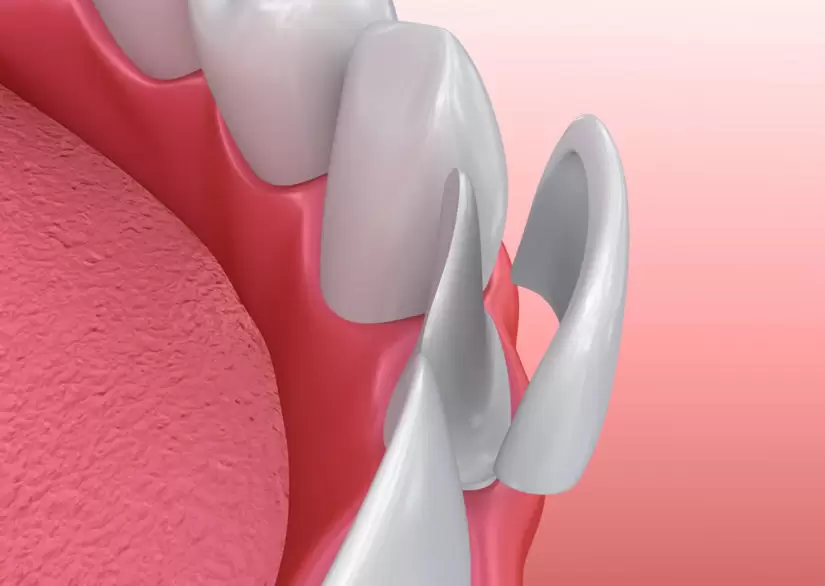
Porcelain veneers are a covering made of thin pieces of porcelain used to for the natural appearance of the teeth. They also provide strength and elasticity as like natural tooth enamel. Porcelain veneers are often preferred to change tooth shape, size, and/or color.

What is Porcelain Veneers?
Porcelain dental veneers, which have an important place in the field of aesthetic dentistry today, appear as an aesthetic solution that makes the smile perfect. Porcelain veneers, which are frequently preferred to deal with problems such as tooth discolorations, shape problems or tooth gaps, offer significant advantages both aesthetically and functionally.
Porcelain dental veneers are a method applied in dentistry to eliminate aesthetic concerns and restore teeth in a healthy way. Thin porcelain layers placed on the front surface of the teeth provide a look and feel similar to natural teeth. This aesthetic solution is used to correct tooth color, repair broken or damaged teeth, close tooth gaps and correct tooth shape.
Porcelain dental veneers have a very similar appearance to natural teeth. Since it has a smooth surface, it prevents plaque formation. In addition, porcelain dental veneers, which have a durable structure, are considered a long-lasting solution. Thanks to its color options and shape harmony, it has a complementary effect on the person’s smile.
How is porcelain veneers applied?
Porcelain veneer treatment begins with a detailed examination and planning. The dentist evaluates the patient’s dental condition and creates a special treatment plan. A minimal cut is made from the front surface of the teeth. Thus, it is aimed that the veneer adapts to the tooth and gains a natural appearance. Thanks to modern technology, the cut can be minimized. In this way, it is possible to preserve the natural structure of the tooth and increase the comfort of the patient. The dentist ensures that the porcelain veneers are placed harmoniously by shaping them according to the patient’s anatomy.
A critical step in porcelain veneer application is for the dentist to take measurements of the prepared teeth. These measurements are transmitted to the laboratory technician and porcelain veneers are specially produced according to the patient’s tooth structure. As a result, the veneers offer a natural look and perfect fit.
After the dentist takes the measurements, the laboratory technician begins the process of manufacturing the porcelain veneers. This usually takes a few days. During this time, temporary veneers are applied to the patient to protect the teeth and provide an aesthetic appearance. Temporary veneers help the patient to smile comfortably and continue their daily activities throughout the treatment process.
Laboratory technicians carefully prepare porcelain veneers. Veneers with color and aesthetic features suitable for the patient’s tooth structure are produced. Special porcelain veneers are carefully placed on the patient’s teeth by the dentist. Their color and form are checked. After the veneers fit perfectly to the tooth structure, they are permanently fixed with a special adhesive. This application is important in terms of meeting the patient’s aesthetic expectations and achieving a natural appearance. After the porcelain dental veneers procedure, the dentist evaluates the patient’s satisfaction by checking the aesthetic suitability and harmony of the veneers.
How to Care After Porcelain Dental Veneers?
Regular cleaning and maintenance should not be neglected for porcelain dental veneers to provide a long-lasting and healthy usage experience. Teeth should be brushed with fluoride toothpaste and a soft-bristled toothbrush after meals. Flossing should also be used to clean between the teeth. Flossing can remove food debris and plaque between the crowns and gums, thus preventing decay. Mouthwash also helps to maintain oral hygiene. Using a mouthwash recommended by your dentist can prevent the growth of bacteria in the mouth and freshen breath. By practicing these maintenance steps regularly, the durability and shine of porcelain veneers can be maintained for many years.
What are the Advantages of Porcelain Veneers?
Porcelain veneers are a dental procedure that offers solutions to aesthetic and functional problems. By placing a thin layer of porcelain on the teeth, it is possible to both improve the aesthetic appearance and increase durability. Since porcelain is a material that is very similar to natural tooth color, a natural and aesthetic appearance can be achieved. Thanks to porcelain veneer treatment, it may be possible to solve many cosmetic problems such as stains, changes in tooth color, curvatures, cracks or gaps between teeth.
Another advantage of porcelain veneer treatment is that it is a long-lasting solution. Porcelain is durable and resistant to abrasion with its structure similar to tooth enamel. Thus, patients have a healthy smile for many years. Since porcelain veneers have high stability, they are resistant to discoloration over time. This offers the opportunity to have a healthy and natural dental aesthetic for a long time.
Another advantage of porcelain dental veneers is that it is a painless application that requires minimal abrasion of the teeth. During the porcelain veneer application, the dentist removes the minimal amount of tooth tissue possible. In this way, patients have an extremely comfortable experience. Individuals who prefer porcelain veneer treatment can achieve aesthetic and functional improvement quickly and comfortably.
Porcelain generally stands out as a material that does not cause allergic reactions and appeals to a wide range of patients. Since it is a material with a low risk of causing allergic sensitivities, many patients can easily use porcelain veneers.
In which cases are porcelain veneers applied?
Porcelain dental veneers are an effective dentistry procedure applied to eliminate serious problems in the teeth. It is preferred to improve the aesthetic appearance of teeth and solve functional problems. It offers a great solution to restore the natural tooth appearance, especially in teeth damaged during root canal treatment. In addition, in case of missing teeth or due to aesthetic concerns, porcelain veneers stand out as a satisfying alternative in terms of both durability and aesthetics. This treatment helps people to regain their smile and maintain dental health.
Porcelain veneers can be a functional solution for teeth with excessive loss of material and underlying decay. With porcelain veneer treatment, mild dental crowding and curvatures that do not require orthodontic treatment can be eliminated. Porcelain veneer treatment can be applied to eliminate abrasion, fractures and decays in the front teeth and gaps between the teeth. Porcelain veneer treatment, which can be applied in case of discoloration and stains on the teeth, also stands out as a functional solution for people who want their teeth to have a more aesthetic appearance.
What are the Types of Porcelain Dental Veneers?
It is possible to classify porcelain dental veneers under 4 basic categories.
Porcelain laminate can be defined as thin porcelain layers bonded to the front surface of the teeth. It has a very similar appearance to natural teeth and is preferred to achieve an aesthetic smile.
Zirconium veneers stand out as an aesthetic and durable option. Zirconium is a highly durable ceramic material and has a similar appearance to natural teeth.
Metal-supported veneers are prostheses that usually have a metal alloy in the substructure and are covered with porcelain or ceramic. It is a preferred option especially for back teeth or when it is necessary to cover most of the teeth.
Full porcelain dental veneers are a preferred option especially for front teeth. Because it offers the most natural results in tooth color, texture and shape.
Porcelain Veneer Tooth Prices
Porcelain dental veneer prices may vary depending on the scope of the treatment to be applied, the number of teeth to be porcelain veneered, material quality, whether different dentistry procedures will be applied, the price policy of the clinic and many other different factors.
Working Hours
- Monday: 09:00 – 18:00
- Tuesday: 09:00 – 18:00
- Wednesday: 09:00 – 18:00
- Thursday: 09:00 – 18:00
- Friday: 09:00 – 18:00
- Saturday: 09:00 – 18:00
- Sunday: Closed
